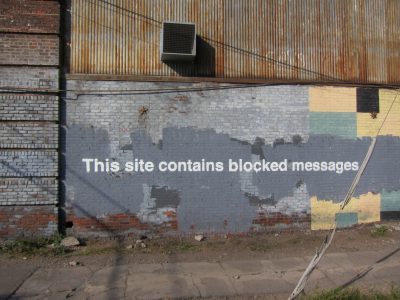
Screen capture from a video of the destruction of the Prophet Jonah Mosque in Mosul, Iraq. ISIS claimed responsibility for the attack. Video by Murtada Al-Yusuf.
Ellery Roberts Biddle, Lisa Ferguson, and Sarah Myers West contributed to this report.
Global Voices Advocacy's Netizen Report offers an international snapshot of challenges, victories, and emerging trends in Internet rights around the world. We begin this week's report with the violent extremist group known as ISIS (or now simply “the Islamic State”) which — like any group seeking to gain popularity and public attention — is using social media to promote its agenda and recruit young people to join its ranks. In the wake of the beheadings of two US journalists by the organization, social media companies like Twitter and Facebook are facing mounting requests to remove ISIS content from their sites. The White House asked social media sites to remove a video showing the beheading of journalist James Foley, and Twitter CEO Dick Costolo tweeted the company’s intent to suspend accounts posting “graphic imagery” of the execution.
In their terms of service, platforms like Google and Facebook prohibit content that promotes violence, terrorism, and hate speech, and reserve the right to remove it from their sites. But situations like this can be challenging to distill – as we’ve documented extensively in the past, claims that posts constitute terrorism or threaten national security have been used to curtail free expression and jail social media users in a number of countries around the world. Recent events are raising more questions about what role, if any, Internet companies should have in making these decisions.
Iran: News sites without a license will be blocked
Under recent changes to the Iranian government's already-stringent media regulatory regime, all online newspapers are now required to register with the Ministry of Culture and Islamic Guidance. Although the Ministry has yet to define exactly what constitutes a news site, officials announced this week that all sites failing to comply with the measure would be blocked “without discrimination.” Sites that do comply will receive six-month subsidies from the Ministry, along with press passes for national events.
Thuggery: Indian student arrested for “disrespecting” the national anthem
In Kerala, India, student and social activist Salman Zalman was arrested on charges of seditionfor allegedly disrespecting the Indian national anthem. A solidarity campaign is calling for his release and the repeal of the laws on sedition and online free speech used to charge him.
Surveillance: German surveillance tech companies are selling most of their products under the table
After conducting a meticulous review of public data released by the German government, researchers at the Centre for Internet and Human Rights at European University found that the majority of surveillance technologies sold to foreign governments by German companies appear to have been sold without a license. Cross-referencing these findings with technical research by the University of Toronto’s Citizen Lab, they posited that British-German corporation Gamma International exported its highly invasive spyware product FinFisher to countries including Bahrain, Ethiopia, Bangladesh, Netherlands, Estonia, Australia, Mongolia, and Nigeria without obtaining state-required licenses. Vying for the support of German citizens increasingly concerned about government surveillance, both the Social Democrat and Green parties in Germany are demanding further government regulation of surveillance tech sales.
Industry: Citizen sues China Unicom over blocked Google services
A Chinese man in Shenzhen is suing China Unicom, his Internet service provider, for leaving him unable to access Google online services. The Chinese government instituted a block on most Google products beginning in May, in anticipation of the 25th anniversary of the Tiananmen Square protests. Although Wang Long, a social activist and expert on local law, is unlikely to be successful, he hopes to draw attention to the restrictions through the lawsuit. The court is expected to issue a decision later this month.
Internet Governance: Russia to set up its own Internet?
A deputy in the Russian parliament asked the Minister of Communications to prepare a “civil defense plan” that authorities would deploy if the the United States were to shut down the country’s Internet. Although there is no credible evidence that this could or would ever happen, the parliamentarian has used this concern as a rationale for Russia to develop a more autonomous Internet that can function without being connected to the global Internet
Netizen Activism: Imagining the Internet “slow lane” to promote net neutrality
Today, September 10, Reddit, WordPress, Vimeo, and even Pornhub have joined US-based NGOs like the Electronic Frontier Foundation and the American Civil Liberties Union [https://www.eff.org/deeplinks/2014/09/reddit-pornhub-websites-slow-down-net-neutrality-september-10] to participate in Internet Slowdown Day, an effort to show users what the Internet would look like if the US Federal Communications Commission implements its new net neutrality guidelines as they currently stand. The sites display an “infinitely-loading site loading icon” to represent the Internet “slow lane” to which certain content would be relegated under the guidelines. EFF has created a simple template [https://dearfcc.org/] through which users to submit concerns under the FCC's call for public comment.
New Research




4 comments